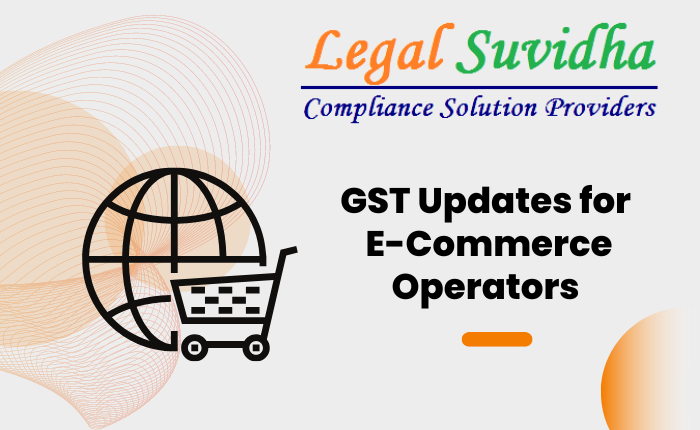With the rise of the Internet and the popularity of smartphones, the E-commerce industry has made impressive progress. In India, E-commerce has become a quick and easy way of conducting business without limitations. In this article, we will explore the concept of E-commerce operators under GST, its associated requirements, and recent updates.
Definition of E-commerce & E-commerce Operators:
According to Section 2(44) of the CGST Act, 2017, Electronic Commerce refers to the selling of goods, services, or digital products over digital or electronic platforms. As per Section 2(45) of the same act, an Electronic Commerce Operator is someone who manages a digital or electronic platform for E-commerce. Examples include Amazon and Flipkart, which allow third-party sellers to offer products through their online marketplaces.
GST Registration for E-commerce Operators:
E-commerce operators must obtain GST registration, regardless of the value of their supplies. They are required to pay GST on the commission they earn from various suppliers, without any exemption limits.
Foreign E-Commerce Operators:
Foreign E-commerce operators are those who operate without a physical presence in India. To operate in India, they need to appoint an agent on their behalf and register under GST in each state where they operate. These operators, responsible for collecting TCS (Tax Collection at Source), must register separately and obtain a unique TCS Collection Number. If an E-commerce operator doesn’t have a physical presence in any state, they can register using their main office address.
When Does an E-commerce Operator Pay GST?
An E-commerce transaction involves three parties: the supplier, the buyer, and the E-commerce operator. GST applies to two main transactions:
1. Between the supplier and the buyer for the supply of goods or services.
2. Between the supplier and the E-commerce operator for the commission earned from using the marketplace.
The E-commerce operator charges GST on both these transactions. However, there are specific transactions listed in section 9(5) of the CGST Act 2017 and section 5(5) of the IGST Act 2017. In these cases, the E-commerce operator must pay GST on behalf of the suppliers.
| S. No. | Description of Specified Service | Supplier of Service |
|---|---|---|
| 1 | Transportation of passengers by a radio taxi, motor cab, maxi cab, and motorcycle | Any person (Individual, HUF, etc.) |
| 2 | Providing accommodation in hotels, inns, guest houses, clubs, campsites, or other commercial places meant for residential or lodging purposes | Any person, except those liable to obtain registration under section 22(1) of the CGST Act |
| 3 | House-keeping, such as plumbing, carpentering, etc | Any person, except those liable to obtain registration under section 22(1) of the CGST Act |
Collection of TCS under E-commerce:
– E-commerce operators collect TCS @1% on the net value of taxable supplies through an online marketplace.
– TCS includes 0.5% CGST & 0.5% SGST.
– TCS payment to the government is due by the 10th of next month.
– TCS deposited by operators appears in suppliers’ GSTR-2A.
– Suppliers claim TCS by filing returns; TCS is reflected in Cash Ledger.
GST Returns by E-Commerce Operator:
– Monthly filing of GSTR-1 and GSTR-3B.
– E-Commerce operator submits GSTR-8 with supply details and TCS.
– GSTR-8 filed within 10 days from the end of the month.
– Annual statement GSTR-9B due by 31st December after financial year.
CBIC Notifications for E-Commerce and GST:
– CBIC allows supplies through E-Commerce without GST registration or composition scheme.
– Conditions and procedures set for e-commerce operators.
– Notifications effective from 01st October 2023.
Notification No. 34/2023-Central Tax dated 31st July 2023:
– GST registration waived for goods supply through ECOs under specific turnover.
– Conditions include no inter-state supply, single State operation, and valid PAN.
– Declarations are required on the common portal.
Notification No. 37/2023-Central Tax dated 04th August 2023:
– ECOs allow supply only if the enrolment number is allotted on the common portal.
– Inter-state supply not permitted; exempt from TCS collection.
– Details of supplies by unregistered persons submitted via Form GSTR-8.
Notification No. 36/2023-Central Tax dated 04th August 2023:
– ECOs and supplies by composition taxpayers.
– No inter-state supply allowed; TCS collected and paid to the government.
– Details of supplies through Form GSTR-8.
Conclusion:
– E-commerce integral to modern business; regulatory landscape evolving.
– E-commerce operators must comply with GST regulations and stay updated.
– Adherence to guidelines ensures seamless operations and compliance.
If You have any queries then connect with us at [email protected] or [email protected] & Contact us & stay updated with our latest blogs & articles




















